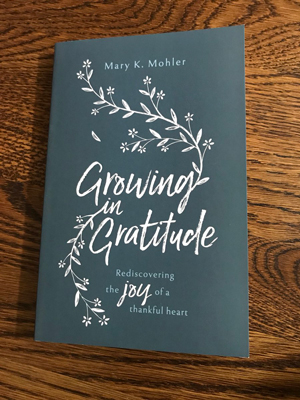EDITOR’S NOTE: In her debut book, Mary Mohler, the first lady of Southern Seminary, encourages readers to pursue gratitude and offers strategies for how to grow in it. Towers contributor Annie Corser sat down with Mohler in her home to talk about the book, Growing in Gratitude.
AC: How important is it to know Scripture in order to have a heart of gratitude?
MM: It’s essential. I think that’s where people often get off-track. The reason I wrote the book was because I see a lack of gratitude — a half-hearted: “Sure, I count my blessings every once in a while.” People don’t realize that it is such a deeply theological issue. In Scripture, we’re told so many times to praise the Lord, to be thankful, and in all circumstances not for all circumstances.
We’re supposed to be abounding with thanksgiving, so I take that very seriously. This gratitude is very deeply rooted in the Word. We cultivate gratitude by understanding that it’s so much more than counting our blessings. I learned a great deal about this from the work of the Puritan pastor, Jonathan Edwards. He explained there are two kinds of gratitude — one is primary and the other is secondary. The primary kind, gracious gratitude, shows thankfulness to the Lord for who he is. The secondary kind, natural gratitude, relates to what he has done. When we make it a habit to thank him for who he is in every specific way we can, we come to appreciate his nature in a whole new way. We deepen our gratitude before we ever get to thanking him for what he has done. Further, as we learn to focus on the grace we have in Christ, our thankful hearts spur us on to act like grateful people who respond by building up the church and spreading the gospel. As Colossians 2:6-7 says, “Therefore as you have received Christ Jesus the Lord, so walk in him, rooted and built up in him and established in the faith, just as you were taught, abounding in thanksgiving.”
AC: What can hinder a heart of gratitude, and what are ways we can counter that?
MM: First, our gratitude can be diminished as we consider the lostness of our dear friends and loved ones, and we can allow it to consume us. We counter this by being ever more grateful for God’s kindness in saving us as we continue to pray for others — and trust that our sovereign God is indeed at work.
Second, how common is it for us to be so busy — even busy doing kingdom work that gratitude gets pushed aside? We almost act like we will save it for when we are rocking in our rocking chairs in our old age and reminiscing about life. Scripture does not teach that. It is replete with references to praise the Lord and be thankful — this is the day! We are to abound in thanksgiving. No delay for busyness.
Third, sometimes we allow discontent over circumstances to rob us of both joy and gratitude. “If only things were different,” we think. God’s word is so clear: 1 Thessalonians 5 says to rejoice always, pray without ceasing, give thanks in all circumstances, for this is the will of God in Christ Jesus for you.
Fourth, doubt and guilt can plague us and hinder gratitude. We lose sight of the truth that we were bought with a price. Scripture teaches us in Jude that “Christ will present us blameless before the presence of his glory with great joy.” How can we not overflow with gratitude for that?
AC: How does Scripture help increase our gratitude?
MM: Scripture just affirms it all over the place. As we pray through the Psalms, that can do nothing but increase our gratitude. If people are struggling with gratitude or can’t get their mind around it, that’s a great way to go about it. We get back to Scripture — especially with the idea of “gracious gratitude” that Jonathan Edwards coined. That was revolutionary to me; I knew nothing about that until I started writing the book and started looking into this more. I came to realize that gratitude is about thanking God for who he is, first of all. That’s primary. Then we move onto thanking him for what he’s done. As you pray through the Psalms and pray prayers of Scripture that are found in other places, as well. That’s the best place to be.
AC: You encourage readers to keep a “blessing journal” and a “thorns journal.” Can you explain those?
MM: This sounds counterintuitive, are you really asking us to praise God and be thankful for the difficulties — the thorns — in our lives? It’s much easier to be grateful when things are going well, but we have to work hard to remain grateful when life hurts. It seems almost foolish to thank God when things are hard. But I think that’s biblical too. And we see that lived out in Paul’s life. He asked three times for his thorn to be taken away. It wasn’t. So therefore, the Lord in his sovereignty, has left that in Paul’s life knowing that all of us today would be reading about this and would be saying, “How can that be?” Paul does not obsess on the thorn but presses on in spite of it — and we should too.
A thorns list, which should be a much shorter list I hope, alongside the praise list helps us be able to say, “Lord I didn’t ask for this. I’m not going to act like I’m happy when I’m not, but I want to thank you for this thorn because you put it there for a reason, and I’ll understand that one day. I want you to use it to your glory and I want you to change my heart and change my attitude.”
For example, we can thank the Lord for the resolve that our thorn in the flesh will not be the hallmark of our life. We will boldly accept the good and the bad. We can thank him for choosing us to walk through this particular adversity for a particular reason — even if we won’t know that reason this side of heaven. We can thank him for the lesson we are learning in the process, and for the people we are perhaps unknowingly encouraging and inspiring along the way. We can thank him for not allowing the thorn to overwhelm us — even as we look forward to the certain joy of being free of it one day as we spend eternity with Christ where there will be no more thorns.
The roses on the list start to smell sweeter as you’re thankful for the thorns.
AC: How can we teach children to be genuinely grateful?
MM: The Lord has given parents the sobering responsibly to teach children well. We don’t do so in hopes they will grow up to be good, moral rule keepers. We pray they will grow up to love the Lord and to know how He blesses them with all good things. Wise parents teach their toddlers to simply say thank you. How sweet it is to hear some baby talk form of “thank you” as some of their first words uttered. How easy it can be for children to feel entitled. I have a section in the book that deals with how we must intentionally replace entitlement with gratitude for all the Lord so generously provides. This must be both modeled and taught. You know, as children grow up to adolescence, it will only get worse as they will be bombarded with the sinful notion that they deserve all good things. We know better. We want to point them to Christ who left his throne in glory to come and die for us— and give us life abundant.
AC: How did writing this book make you personally more grateful?
MM: It’s very difficult to admonish women to be more grateful if you have a complaining and negative spirit. So I found myself more than once having to go, “Wait a minute, what are you writing about now? Let’s remember that, and turn this around and find a way to be grateful.” So it’s definitely been a sanctification process — as so many things in life are — that the Lord Jesus uses to grow us and change us to his likeness.






